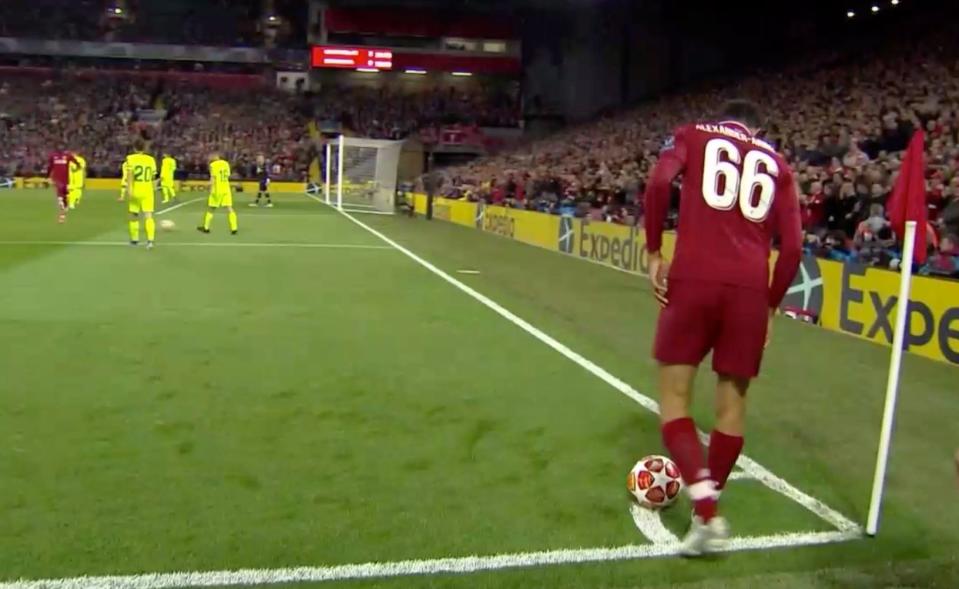A 20-year-old completed Liverpool's epic comeback against Barcelona with a stroke of genius
Liverpool was without Mohamed Salah. Without Roberto Firmino. And presumably without a prayer, down 3-0 heading into Tuesday’s Champions League semifinal second leg against Barcelona.
But after one of the most remarkable European nights in soccer history, the Reds are heading to the final thanks to the genius of 20-year-old right back Trent Alexander-Arnold:
TRICKERY FROM ALEXANDER-ARNOLD TO GIVE @LFCUSA THE LEAD 🤯
Watch now on #BRLive: https://t.co/2AEu63xVD2 pic.twitter.com/Q7FgEWLNW8— Bleacher Report Live (@brlive) May 7, 2019
As 21 players – including the eventual goalscorer, Divock Origi – sauntered about, waiting to set up corner routines and sort out defensive assignments, or just watching on with the tie knotted at 3-3 on aggregate in the 79th minute, Alexander-Arnold stunned Barca with his quick-thinking.
The anatomy of Liverpool’s winner
Alexander-Arnold had been prepared to let Xherdan Shaqiri take the corner. He’d placed the ball by the corner flag and begun to walk away from it as Shaqiri, a left-footed winger, strolled toward it.
But then the English fullback spotted Origi completely ignored by Barcelona players, who were waiting for the Belgian striker to join others at the top of the penalty area.
And if you watch the replay closely, it appears Origi himself almost turned his head away as well – only to realize just in time what Alexander-Arnold was about to do:
TAA-to-Origi, angle No. 2: pic.twitter.com/Ykw5E2YrYt
— Henry Bushnell (@HenryBushnell) May 7, 2019
How did Origi get so open?
That Origi appeared to be just as unaware as every other player in the penalty area explains how he eluded Barca’s attention.
Seconds before the corner was taken, there were actually two balls on the pitch. And it was Origi who disposed of one of them, knocking it out of play so that the one Alexander-Arnold had retrieved could be used.

That might help explain why Barcelona players, including goalkeeper Marc-Andre Ter Stegen, were so singularly focused on what was happening in the penalty area and not on what was happening over at the corner flag:
Barcelona wasn't even looking 🤭 pic.twitter.com/MJO2WaNLXB
— Bleacher Report Live (@brlive) May 7, 2019
This wasn’t some cheeky ploy from Origi and Liverpool, though. (And it was plenty legal, because one ball was off the field well before Alexander-Arnold put the other in play.) Origi was just as surprised as everybody else when he saw that ball skimming toward him.
And when Alexander-Arnold stepped back to it, the one player possibly in position to cut out his cross misread his intentions. Barcelona fullback Jordi Alba saw the Liverpool youngster reversing course – but figured he was about to play a short corner to Shaqiri:
Not sure a 20-year-old has ever done something so smart on such a big soccer stage.
TRENT ALEXANDER-ARNOLD, folks.
(better video this time)https://t.co/IikAVQnLUe pic.twitter.com/bedlSQBuKp— Henry Bushnell (@HenryBushnell) May 7, 2019
Rather than step back toward the end line and into the passing lane, Alba stepped toward the ball, and left Origi free to stick a dagger in Barca’s heart.
Was this a brilliant, deceptive set play?
Some wondered whether the surprise nature of the play had been in the works all along. Whether Origi’s nonchalance and Alexander-Arnold’s steps away from the ball had been clever disguises.
Alexander-Arnold confirmed after the game, though, that this was a spur-of-the-moment decision.
"It was just one of those moments where you see the opportunity,” he explained to BT Sport.
Alexander-Arnold’s genius
The vast majority of soccer teams are consistently content to take their time on set pieces. To bet on their pre-planned, orchestrated, well-drilled plays against an opponent’s well-drilled defensive plan. Why? Because humans crave control. Set pieces are among the few controlled environments within a soccer match. So, naturally, managers and players are inclined to savor them.
But Liverpool manager Jurgen Klopp loves chaos. He instills that love into his players. And Alexander-Arnold, a Liverpool academy product, is one of his prized pupils. That the 20-year-old, of all people, was the one to make such a brilliant quick-twitch decision in such a massive moment is no coincidence.
And quick, non-pre-meditated decisions of this ilk are almost always probabilistically sound ones. They look foolish when they don’t come off, leading commentators and fans to bemoan wasted opportunities. But only 13 percent of corners – the vast majority of them taken with both teams set – result in shots, and roughly two percent result in goals. The lack of unstructured or creative corner plays are one of soccer’s many inefficiencies.
The remarkable part of Alexander-Arnold’s play, therefore, isn’t that it worked. It’s that such an inexperienced player in such a pressure-packed environment had the guts and the intelligence to pull it off.
– – – – – – –
Henry Bushnell is a features writer for Yahoo Sports. Have a tip? Question? Comment? Email him at henrydbushnell@gmail.com, or follow him on Twitter @HenryBushnell, and on Facebook.
More from Yahoo Sports:


